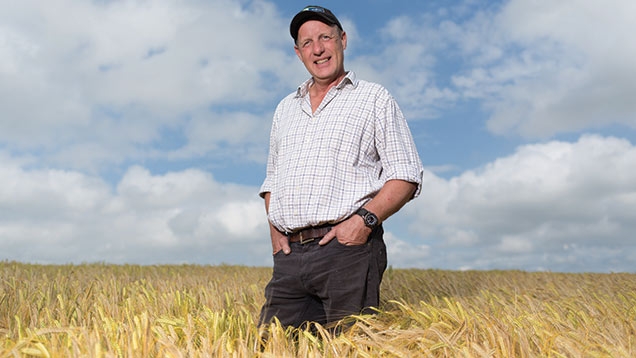Farmers Weekly Awards 2015: Arable Farmer of the Year
 David Miller ©Tim Scrivener
David Miller ©Tim Scrivener David Miller
Wheatsheaf Farming, Hampshire
David Miller’s determination to improve soil health has helped secure the future of Wheatsheaf Farming, enabling the business to weather periods of low grain and oilseed prices.
There was a reliance on a good year to make it pay, he says. “We were also seeing a plateauing of yields.”
A complete overhaul of the farming system saw a move to no-till using cover crop roots to do the cultivations instead of metal.
See also: More about the Farmers Weekly Awards
He has always been interested in cover crops, but it wasn’t until he attended a Royal Agricultural Society of England workshop on enriching soils that he decided to give it a go.
Farm facts
- The Wheatsheaf Farming Company crops six farms on behalf of the owners/tenants
- Total of 1,600ha
- Cropping winter wheat, oilseed rape, winter and spring barley, spring oats, yellow linseed and cover crops
- Four full-time staff
- Soils are light flints over chalk
There were ups and downs along the way. “An early mistake was wondering if we were going to get the establishment costs back as benefits in the next crop. But it is a long-term process,” he says.
David started his own trials with a bean and vetch autumn cover crop and drilled spring barley into it.
“Using leaf N analyses, we could see a big difference compared with a field with no cover crop.”
Amazingly, big yield benefits were still being seen in the following crop, 18 months after ploughing in the cover crop, he says.
In 2014, he convinced the company partners to fully adopt the new approach, recognising soil health was the limiting factor.
This has led to oilseed rape being dropped completely from the rotation this autumn, as the economics no longer stack up at £260/t.
Winning ways
- Passion and strong belief in what he is doing
- Has a very detailed technical knowledge of soils
- Excellent, uniform-looking crops
The crop is also not a host species of mycorrhizal fungi and David wants to build up levels of this fungi in the soil and growing rape hinders this.
“They have a big part to play in increasing yields by improving the ability of roots to forage further for available nutrients, boosting root performance by up to 700%,” he explains.
As part of his continued quest for better soil health, David is moving to the Cross Slot direct drill run in tandem with a new stripper header on the combine.
The system does not only improve soil health, there are cost benefits too and David has seen a £15/ha saving in labour and fuel.
He is successfully adding value to crops where possible with spring barley and spring oats for seed, milling wheat accounting half of the wheat area and yellow linseed for the human market.
Good relations with the local community and the next generation is also important to David, who is a steward at the South of England Society’s Countryside Day, where 2,500 year 5 and 6 pupils find out about farming.
He even hosts his own open day for local schools.
“One reason is we require a very skilled workforce and these positions will ultimately be filled from this pool of young people.”
Looking to the future, David is much more positive. “I could not see the previous system having a sustainable future.”
Finalists
Charles Matts
Brixworth Farming, Northamptonshire
His unique relationship with his merchant means he is adding value to all crops. He is also successfully winning the war on blackgrass thanks to a novel traffic-light approach to prioritising the worst fields.
Graham Potter
Grange Farm, North Yorkshire
Graham’s passion for precision technology has led to better soil fertility and higher crop yields. He has also developed a groundbreaking app, allowing him to control his grain dryer from the combine cab.
Sponsor’s message
“David Miller is a worthy winner of Arable Farmer of the Year. He has a passion for soil management and has implemented innovative improvement strategies to ensure long term, sustainable crop production”
Charlie Whitmarsh, crop production director



